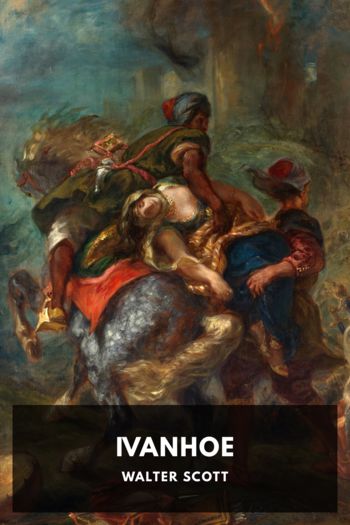Ivanhoe - Walter Scott (bookreader txt) 📗

- Author: Walter Scott
Book online «Ivanhoe - Walter Scott (bookreader txt) 📗». Author Walter Scott
After this fourth encounter, there was a considerable pause; nor did it appear that anyone was very desirous of renewing the contest. The spectators murmured among themselves; for, among the challengers, Malvoisin and Front-de-Boeuf were unpopular from their characters, and the others, except Grantmesnil, were disliked as strangers and foreigners.
But none shared the general feeling of dissatisfaction so keenly as Cedric the Saxon, who saw, in each advantage gained by the Norman challengers, a repeated triumph over the honour of England. His own education had taught him no skill in the games of chivalry, although, with the arms of his Saxon ancestors, he had manifested himself, on many occasions, a brave and determined soldier. He looked anxiously to Athelstane, who had learned the accomplishments of the age, as if desiring that he should make some personal effort to recover the victory which was passing into the hands of the Templar and his associates. But, though both stout of heart, and strong of person, Athelstane had a disposition too inert and unambitious to make the exertions which Cedric seemed to expect from him.
“The day is against England, my lord,” said Cedric, in a marked tone; “are you not tempted to take the lance?”
“I shall tilt tomorrow” answered Athelstane, “in the melee; it is not worth while for me to arm myself today.”
Two things displeased Cedric in this speech. It contained the Norman word “melee,” (to express the general conflict,) and it evinced some indifference to the honour of the country; but it was spoken by Athelstane, whom he held in such profound respect, that he would not trust himself to canvass his motives or his foibles. Moreover, he had no time to make any remark, for Wamba thrust in his word, observing, “It was better, though scarce easier, to be the best man among a hundred, than the best man of two.”
Athelstane took the observation as a serious compliment; but Cedric, who better understood the Jester’s meaning, darted at him a severe and menacing look; and lucky it was for Wamba, perhaps, that the time and place prevented his receiving, notwithstanding his place and service, more sensible marks of his master’s resentment.
The pause in the tournament was still uninterrupted, excepting by the voices of the heralds exclaiming—“Love of ladies, splintering of lances! stand forth gallant knights, fair eyes look upon your deeds!”
The music also of the challengers breathed from time to time wild bursts expressive of triumph or defiance, while the clowns grudged a holiday which seemed to pass away in inactivity; and old knights and nobles lamented in whispers the decay of martial spirit, spoke of the triumphs of their younger days, but agreed that the land did not now supply dames of such transcendent beauty as had animated the jousts of former times. Prince John began to talk to his attendants about making ready the banquet, and the necessity of adjudging the prize to Brian de Bois-Guilbert, who had, with a single spear, overthrown two knights, and foiled a third.
At length, as the Saracenic music of the challengers concluded one of those long and high flourishes with which they had broken the silence of the lists, it was answered by a solitary trumpet, which breathed a note of defiance from the northern extremity. All eyes were turned to see the new champion which these sounds announced, and no sooner were the barriers opened than he paced into the lists. As far as could be judged of a man sheathed in armour, the new adventurer did not greatly exceed the middle size, and seemed to be rather slender than strongly made. His suit of armour was formed of steel, richly inlaid with gold, and the device on his shield was a young oak-tree pulled up by the roots, with the Spanish word Desdichado, signifying Disinherited. He was mounted on a gallant black horse, and as he passed through the lists he gracefully saluted the Prince and the ladies by lowering his lance. The dexterity with which he managed his steed, and something of youthful grace which he displayed in his manner, won him the favour of the multitude, which some of the lower classes expressed by calling out, “Touch Ralph de Vipont’s shield—touch the Hospitallers shield; he has the least sure seat, he is your cheapest bargain.”
The champion, moving onward amid these well-meant hints, ascended the platform by the sloping alley which led to it from the lists, and, to the astonishment of all present, riding straight up to the central pavilion, struck with the sharp end of his spear the shield of Brian de Bois-Guilbert until it rung again. All stood astonished at his presumption, but none more than the redoubted Knight whom he had thus defied to mortal combat, and who, little expecting so rude a challenge, was standing carelessly at the door of the pavilion.
“Have you confessed yourself, brother,” said the Templar, “and have you heard mass this morning, that you peril your life so frankly?”
“I am fitter to meet death than thou art” answered the Disinherited Knight; for by this name the stranger had recorded himself in the books of the tourney.
“Then take your place in the lists,” said Bois-Guilbert, “and look your last upon the sun; for this night thou shalt sleep in paradise.”
“Gramercy for thy courtesy,” replied the Disinherited Knight, “and to requite it, I advise thee to take a fresh horse and a new lance, for by my honour you will need both.”
Having expressed





Comments (0)